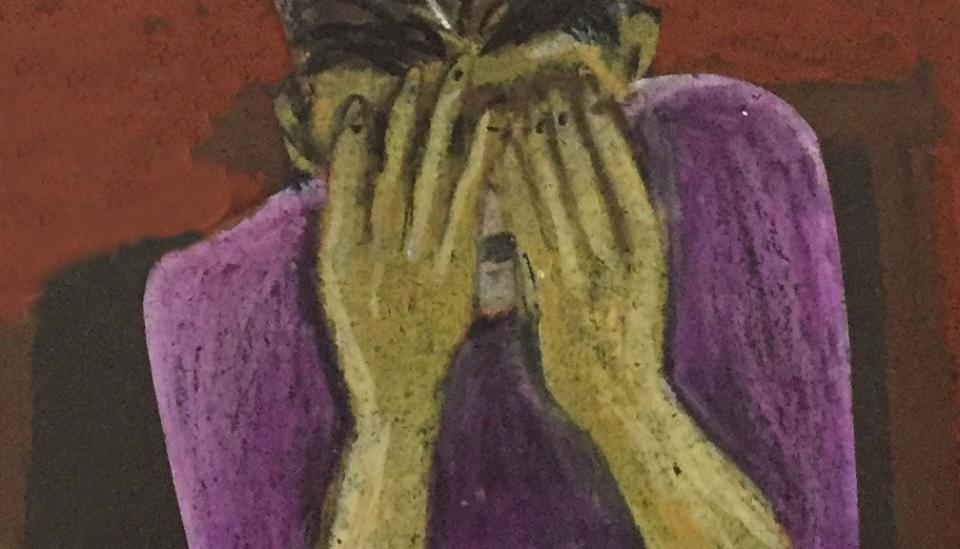
Image description: Illustration of person holding head, by Dr. Sylvia Karpagam.
Non-consensual dissemination of intimate images is quickly becoming one of the major challenges that women in Uganda online have to overcome. The women that are targeted are women of influence - musicians, models, journalists, bloggers and women with online influence.
Women in Uganda find themselves in a position where they have nowhere to turn to; they are caught between a rock and a hard place, or between the reality of non-consensual circulation of intimate images (NCII) and the laws that police their bodies. NCII commonly refers to when women’s images have been shared non-consensually by jealous ex- jilted lovers, and this should be treated as a breach of trust and infringement of privacy and not as pornography. It is in fact absurd that the laws have classified women’s bodies broadly as pornography.
It is in fact absurd that the laws have classified women’s bodies broadly as pornography.
In 2014, Uganda passed an Anti-Pornography Act and a nine-member anti-pornography committee was instituted to enforce it. This Act was welcomed by religious and cultural leaders because its proponents said that it was to fight against child pornography and indecency. In this Act, pornography is defined as
“Any representation through publication, exhibition, cinematography, indecent show, information technology or by whatever means, of a person engaged in real or simulated explicit sexual activities or any representation of sexual parts of a person for primarily sexual excitement”
So, in this case, women whose photos have been shared non- consensually end up being hunted by the police when their nude pictures were leaked to the internet. In July 2018, the Daily Monitor newspaper reported a 23- year old university student was arrested appeared before the court and remanded to Luzira maximum prison in Kampala. She was later released on bail.
The act stipulates that a committee be formed and so a nine-member committee was formed in 2017. In recent cases, this committee has preoccupied itself with hounding and hunting of women whose nudes have been published non-consensually. These women are investigated and asked how their nudes got onto the internet. This is chasing after the victim while the perpetrator gets away scot-free like in the case of the 23-year old university student.
According to Ophelia Kemigisha a Lawyer at Chapter4Uganda, “The Anti Pornography Act as it is now is vague and does not provide specifically for the prohibition of non-consensual distribution of private images. What the law has is a blanket prohibition of publication, production, and broadcast of pornography. This means that "revenge porn" is not quite prohibited as it is not pornography anyway. The law lacks a framing of the issue as violence, and that is why victims have found themselves being the ones who are arrested for "broadcasting" pictures yet they are not responsible for publishing them. Lawmakers need to make a specific law that provides for this form of violence in order to protect victims and bring perpetrators to book”
The law lacks a framing of the issue as violence, and that is why victims have found themselves being the ones who are arrested for "broadcasting" pictures yet they are not responsible for publishing them.
The media which is supposed to be an ally in the fight for Human Rights instead doubly victimises the women through sharing their names and their portrait photos in the news articles that they publish. There are hundreds of online sites that in their search for relevance publish the nude photos on their websites but the committee doesn’t go after them.
Uganda has one hundred and one problems, including a huge national debt, unemployment, dilapidated infrastructure, poverty, poor healthcare, corruption, and yet this committee was given 2 billion Uganda shillings which in my opinion is a misplaced priority. This money could be dedicated to ensuring that more Ugandan women are connected to the internet Regionally, only one in nine women in Africa has access to the internet. According to a report by the Web Foundation only about 37% of women surveyed in ten selected cities in the world, including Kampala, were found to be using the internet compared to 59% of men. The few women online are leveraging the internet to speak truth to power, fight harmful patriarchal beliefs, advance their careers and to innovate solutions for their communities.
Unfair laws like the Anti-Pornography Act have fueled the misogyny online. Patriarchy crawls into the internet following the women to online spaces. Along with rampant NCII, there is hurtful outright sexism that targets confident women especially those who are vocal and show agency. All this is in order to silence women, and this rubs off on other women that are online, subduing them and leading to self-censorship.
It is ironical that the Computer Misuse Act 2011 doesn’t apply when women’s privacy is violated but only applies when it affects those in power, to crackdown dissent – like in the case of Stella Nyanzi, a Ugandan academician who is remanded at Luzira prison in Kampala for her Facebook posts which the prosecutor claims disturbed the peace of Uganda’s President Yoweri Museveni.
It is ironical that the Computer Misuse Act 2011 doesn’t apply when women’s privacy is violated but only applies when it affects those in power, to crackdown dissent – like in the case of Stella Nyanzi.
Non-consensual dissemination of intimate images has damaging effects and the person’s reputation is compromised. In a study conducted by Samantha Bates, “Revenge porn and mental health: A qualitative analysis of the mental health effects of revenge porn on female survivors” she writes;
“Along with the loss of trust, many participants experienced more severe and disruptive mental health effects, often being given official medical diagnoses of PTSD, anxiety, and depression. Many participants also noticed a change in their self-esteem and confidence after they were victimized. Part of the reason that revenge porn had such a negative effect on participants’ self-esteem and confidence was the loss of control they experienced. The loss of control over one’s body was a particularly violating aspect of revenge porn, similar to sexual assault.”
Google, Facebook and other intermediaries when requested to take the photos down, sometimes comply because they have now moved towards protecting women online. For the victims however, the glass is shattered and picking up the pieces seems like a hard task. For some women that have a following online, they come back with a bang. Women’s bodies are is not a shameful thing that society has made them out to be and as Lindsey Kukunda, the founder of Not Your Body, recently wrote - “shame is in the eyes of the beholder.”
The media must realise that they can facilitate the respect of rights of those whose images have been shared by ditching sensationalism and passing on the message that sharing of intimate images on the internet by third parties is the fault of the perpetrator and not the victim. And civil society will have to wake up and fight for laws that protect women online, to challenge laws like the anti-pornography law that police women’s bodies and the Computer Misuse Act that restrains freedoms of expression
- 5399 views






Add new comment